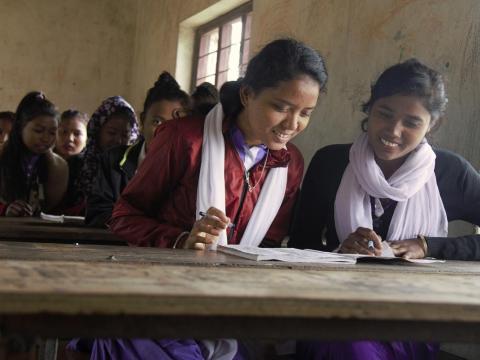Why I will never stop making the case for children

Children give us so many reasons to hope, but on Human Rights Day Dana asks if we can rise to the challenge of meeting their needs.
By Dana Buzducea
I cannot wait for this pandemic to be over. But at the same time, one thing really worries me about the aftermath – the unprecedented growth of inequality, in all its forms, among children. I don’t think any one of us can fully anticipate the cost to humanity of this extreme polarisation. Children are sounding the alarm, and I truly believe the best use of our time and investment now is in saving this generation of children from spiralling inequality.
With almost every national health system under stress, we are unable to prioritise children’s basic health needs, including immunisation. Education is suspended, as if we can freeze children’s development and there’ll be no negative effects. Online education is simply not accessible to all, and while some parents have been able to invest in increasing their children’s access to media tools for education, the absence or delays in this mean children have lost what they were learning in school months ago. Violence against children has been the stress valve release for both adults and other children in far too many households, communities and cyberspace, this new Agora of our times, where all society’s ideas, fears, anxieties and hopes are voiced.
All my career I have advocated for children’s unimpeded access to basic services, regardless of their status, as the only possible way to reduce the deeply discriminating and intergenerational cycle of poverty. I was blessed to start my career in a time when our world leaders affirmed that “childhood is entitled to special care and assistance” (UNCRC, Preamble). A generation after we recognised that children everywhere have rights, through the UN Convention on the Rights of the Child, COVID-19 means the most vulnerable children risk never realising theirs. What is new, and so deeply disturbing, in this pandemic is the real risk that children’s voices and input will be ignored, because of the all-consuming nature of the crisis.
It’s a myth that children are incapable or irrelevant when it comes to decision making. The UN Convention on the Rights of the Child guarantees the right of children to express their views, and for those views to be given weight according to their relative age and maturity – we know children are capable of contributing to the decisions that affect them. Thousands of children have proved children’s voices matter and dispelled the myth they have nothing to say and nothing to contribute.
I learned early on, as a social worker in Romania specialising in child protection, how important it is to listen to children, and it is subject that remains close to my heart. Because I know that we cannot assume we understand children’s perception of our world better than they do. And the only way to understand how they see it, is to really listen.
There’s no excuse not to listen. They are telling us, at every opportunity, what is happening in their lives and what we need to pay attention to. In our report Act Now, 81% of children talked about increased violence during the pandemic. In a survey we’ve published today, children in 12 countries told us of the devastation and death they have seen, caused by climate change, and their fears about the damage the climate crisis has inflicted on the planet, and the impact that it will have on their future.
But they also show the signs of courage, resilience and determination that we know they have so much of. Our experience shows that when empowered and supported, children are not passive victims but can be hidden heroes in times of need. As 15-year-old Isidora in Chile says: “I would ask the governments to carry out campaigns to protect the environment and to involve us, children, who are more committed than the adults to stop climate change. They need to support us in doing things for the environment.”
Children who speak out open a window for us to see into their reality. They overcome hardship and they are using their voice to empower and stand up for others. And for this, I think they are real heroes. I have met so many inspiring young leaders who have helped to change their communities. I have learned so much from my dialogues with children and youth around the world. And I believe we are blessed with a young generation that is wise, generous and brave, and who right now needs our help to achieve their God-given potential so that the world will be in good hands when they will take over.
Nelson Mandela said that “poverty is man-made […] and can be removed by the actions of human beings.” Our world has been blessed with the means to do it, but it takes all of us to cooperate in prioritising children. Will we rise to the challenge?
Dana Buzducea is World Vision’s Partnership Leader for Advocacy and External Engagement. Follow Dana on Twitter @DanaBuzducea